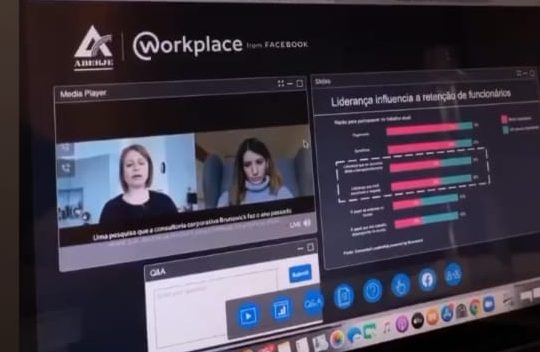Workplace from Facebook and Aberje’s Master Class discusses active and engaged leaders

By Aurora Ayres

As a general rule, connected organizations are 21% more profitable, 17% more productive, and have 40% less talent turnover than competitors, according to research by Gallup. These figures were presented on April 23, during the opening of Aberje’s Master Series program in partnership with Workplace from Facebook.
The results were presented during the presentation “Connected Executives – How to make their leaders active, visible, and engaged,” by Workplace from Facebook’s Global Communications Solutions Leader, Abby Guthkelch. She showed how organization leaders are embracing the reality of working remotely due to social isolation while becoming more visible and making their companies more connected. “We believe that in the modern work environment, connected organizations are the most successful,” she said.
For the first time in 20 years of its history, the global Edelman Trust Barometer 2019 study found that the employer is now the most trusted institution in the world, surpassing the media, governments, and NGOs. According to Guthkelch, this explains why employers’ communications are the most credible source of information about the coronavirus. A special edition of Edelman Covid 19 shows that 63% of the population believed in information on a website after one or two exposures, against 58% for government websites and 51% for conventional media.
Guthkelch said that, even before the pandemic, more data show that people want to listen to their leaders. The two-way dialogue is essential for companies connected in contact with the public, she said. “You need to convey messages with authenticity to generate trust, visibility, and transparency. That way, you consolidate your presence as a leader, build your reputation, and ensure that, at times like this, you will not start from scratch to solve problems and get your messages across ”, she concluded.
Paloma Redondo, Internal Communication Business Partner for Workplace from Facebook, stressed that no one needs to be active all the time. “I try to guide our leaders so that they disconnect a little from work on weekends and, instead of chatting, participate in groups,” she said. “The ideal situation is to make room for everyone within the leadership team so that they can play their part in a way that does not always overwhelm the same people.”
Aberje’s general director, Hamilton Santos, stressed that every company must observe some universal protocols and codes that support the production of quality information and entertainment. “In a moment of extreme downplaying of the truth, we have to fight not only COVID-19 but also the fake news virus. Today, when disclosing information, either internally or externally, the organization needs to obey some protocols to combat fake news”.
Santos said that communications professionals must think like leaders. “They must assume the responsibility of guardian of the institutional narrative, remembering that the CEO now exercises the greatest guardian of the company’s reputation. It is necessary to be aware that communication is a competence that must be part of all professionals in the organization. And the head of communication needs to observe that this competence is being distributed within the organization”.
But, how to do that? One way, according to Aberje’s director, is to partner with other areas of the company, especially Human Resources. “Good communication begins with active listening. A key point for more cohesive narratives is that these professionals help the leadership to navigate within a culture of divergence, without causing conflict or disengagement. More than ever, it is impossible to lead if you are not able to understand people’s feelings and the patterns of feelings within the organization,” he said.
COMENTÁRIOS:
Destaques
- Escola Aberje leva comunicadores para Amazônia em expedição imersiva
- Encontro de líderes debate responsabilidade do setor empresarial e papel da comunicação na COP30
- Aberje realiza reunião presencial com Comitês de Estudos Temáticos em São Paulo
- A comunicação é forte em mercados em que as associações são fortes
- Aberje participa do painel de entidades no 19º Congresso da Abraji
ARTIGOS E COLUNAS
Marcos Santos Maratona da vidaMônica Brissac Thought Leadership: marca pessoal x reputação corporativaLetícia Tavares Liderança comunicadora: um tema sempre atualHamilton dos Santos Comunicação é estratégica na economia contemporâneaCarlos Parente Um salto ornamental para mergulhar no pires



























